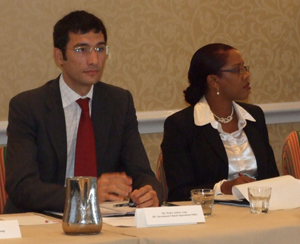|
|
|
Government Takes Steps to Make Doing Business Easier

|
|
|
|
|
|
|
| Fidela Clarke, Director General of the Registrar of Companies and IFC’s Operation Officer for Investment Climate, Pedro Andres Amo |
|
|
|
Basseterre, St. Kitts, August 14, 2010 (SKNIS): The Government of St. Kitts and Nevis is working to reduce bureaucratic red tape and make it easier to “Do Business” in the Federation.
Currently there are eight steps to incorporate a company locally, which involves interfacing with many Government agencies. While appearing on the August 10, edition of SKNIS Perspectives, Fidela Clarke, Director General of the Registrar of Companies, said reviews are ongoing to simplify and lessen the process.
“The proposed reforms will tend to consider amalgamating some of the [procedures] together so that instead of going to various agencies you would be able to go to only one place to have certain things done at the same time,” Ms. Clarke said.
She noted that one proposal being considered is to have the Company’s Registry interact with the Inland Revenue Department and Social Security to get a tax identification number and registration numbers on behalf of prospective businesses. This interaction will be much more efficient, rather than having business representatives approach each agency separately at different stages in the registration process.
“We’d be killing several birds with one stone,” Ms. Clarke emphasized.
The reforms were prompted after the Federation was ranked number 76 out of 183 countries in the World Bank Doing Business Project, which provides objective measures of business regulations and their enforcement. The rankings are from the Doing Business 2010 report, covering the period June 2008 through May 2009.
According to the website doingbusiness.org, St. Kitts and Nevis is out ranked by CARICOM neighbours St. Lucia listed at 36, Antigua and Barbuda, ranked 50, the Bahamas at 68, St. Vincent and the Grenadines rated at 70, and Jamaica at 75. The ranking for Starting a Business is the twin-island Federation slipping to number 86.
Director General Clarke explained that Government is receiving assistance from the World Bank via the International Finance Corporation (IFC) to implement the reforms designed to facilitate greater service delivery to the private sector and the general public.
IFC’s Operation Officer for Investment Climate, Pedro Andres Amo, told SKNIS that his institution’s vision is to “improve the lives of citizens through private sector development.” He revealed that the local project is part of an ongoing engagement between the IFC and the Canadian International Development Agency (CIDA) which has been working with Governments of the Organisation of Eastern Caribbean States (OECS) on how the business environment can be improved.
In addition to starting a business, the IFC is also advising local authorities on trading across borders which focuses primarily on importing and exporting issues.
Mr. Amo added that while the rankings are useful, they are just one component of the overall functioning of an economy. He stressed that Government must continue the process in the long-term so as to meet the needs of the people and ensure that the local economy does not fall behind other countries that are constantly upgrading procedures.
“We have a tight work plan ahead of us and we are asking all the different stakeholders to participate as much as they can,” the IFO official stated, echoing the sentiments of Government officials who have called on the private sector to openly contribute during consultations.
The IFC is also currently working with authorities in Grenada, St. Lucia and Dominica.
|
|
|
|
|
|
|
|